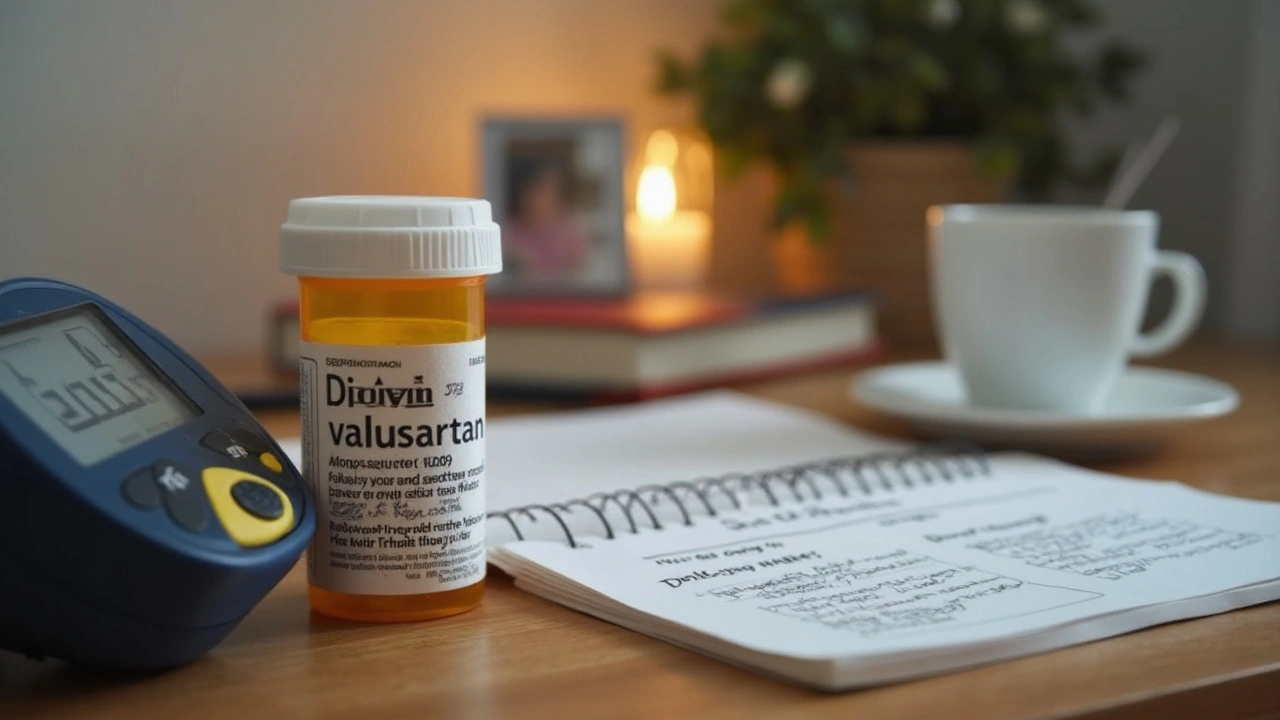Ever wonder why a tiny pill like Diovan shows up in so many medicine cabinets? It isn’t one of those miracle drugs you see hyped on late-night infomercials, but it’s an unsung hero when it comes to managing blood pressure and protecting your heart. The irony is, many people dealing with high blood pressure barely notice their symptoms. It’s often called the "silent killer" for a reason—the first sign could be something serious like a stroke or heart attack. So, a medicine like Diovan might quietly be doing the heavy lifting in the background, working to prevent a health disaster you may never even see coming. Now, what’s actually inside that little pill, and why is it so widely prescribed?
How Diovan Really Works and Why It’s so Popular
Diovan is the brand name for valsartan, an angiotensin II receptor blocker (ARB). I know that sounds technical, but here’s what it really means: Diovan helps relax your blood vessels. When your blood vessels relax, your blood pressure goes down. Imagine you’re squeezing a hose—you let go, the water flows with less force. That’s essentially how Diovan works in your arteries. It blocks a substance called angiotensin II, which usually causes your blood vessels to tighten up. So, Diovan makes it easier for your heart to move blood around, which also means your heart doesn't have to work so hard. This is not just about comfort, but about stopping your heart from wearing out too fast.
Now, who gets prescribed Diovan? It’s the usual suspects—folks with hypertension, some struggling with heart failure, and even people recovering from a heart attack. Sometimes, it’s used alone, but often doctors combine it with other meds if you’ve got blood pressure that refuses to budge. Since Diovan came out in the late 1990s, it’s been one of the go-to choices. One thing that makes it popular with doctors is that it usually doesn’t cause a persistent, hacking cough, unlike some older blood pressure meds called ACE inhibitors. For people who have had to quit other meds because of annoying side effects, Diovan can feel like a straight-up lifesaver.
The standard starting dose? Usually 80 mg once per day for high blood pressure, but this can go up to 160 mg or even 320 mg depending on your numbers and how your body reacts. Doctors prefer to start low and slowly work their way up, since you don’t want your blood pressure to bottom out. It comes in tablet form, and you take it by mouth—pretty simple, really. It’s important to stick to the same time each day so you keep the medicine working smoothly in your system.
What makes Diovan a standout is how long it’s been in use with reliable safety data. You’ll see study after study showing most people find it just as effective as the older medications but with fewer side effects. And when you mix it with things like hydrochlorothiazide (a water pill), it can really pack a punch, especially for those stubborn cases. Insurance companies tend to cover it, and now that some forms are generic, the price tag isn’t so rough anymore. For anyone curious, valsartan itself wasn’t scandal-free—it faced recalls a few years ago due to contamination issues in some batches, but manufacturing oversight is much tighter these days.

What to Expect: Benefits and Side Effects (And How to Manage Them)
Let’s be real—no one looks forward to starting another prescription. The good news is, most people on Diovan don’t notice any huge changes day-to-day, which is both a blessing and a challenge. The blessing: fewer headaches, dizziness, or swelling compared to some other hypertension meds. The challenge: because there’s nothing dramatic happening, you might wonder if the drug is doing anything at all. The only real way to know is to keep an eye on your blood pressure readings—pick up a home monitor and write down your numbers, because your doctor is going to want to see your progress.
But, like anything else you put in your body, there’s always the potential for side effects. Here’s what usually comes up with Diovan:
- Headache or dizziness, especially at first, or if you get up too fast from a chair.
- Fatigue, making you feel wiped out in the early days of taking it.
- Back pain or joint soreness—not super common, but it happens for some folks, especially if you’re sensitive to medication changes.
- Stomach upset, occasional diarrhea, or nausea. Usually mild and it tends to disappear as your body adjusts.
- An increase in blood potassium levels. This is rare, but if you ever get muscle weakness or an irregular heartbeat, it’s a reason to call your doctor fast.
- Changes in kidney function, especially if you already have kidney issues—another reason regular blood tests matter.
The trick is not to let fear of side effects scare you off. If you experience anything odd, jot it down before your next doctor’s visit. And if something feels off—like chest pain or swelling in your lips or throat, which could be an allergic reaction—don’t wait around, get medical help.
One cool tip: Diovan plays nice with food. You can take it with or without meals, but some folks find it’s easier on the stomach after you’ve eaten. Just make sure to take it the same way each day, so your body knows what to expect.
Alcohol and Diovan... not the best mix. Alcohol can drop your blood pressure too low, leaving you woozy or even causing a nasty fall, especially in the first week or two as your body gets used to the drug. If you’re used to an occasional beer or a glass of wine, check with your doctor about how much is safe for you.
Some people get creative, looking for "natural" ways to lower blood pressure so they can skip their meds. That’s understandable, but don’t ditch your prescription overnight. Lifestyle changes matter a ton. Reducing salt, getting exercise, dropping some pounds, and even just remembering to stand up slowly in the morning can help. These changes work best side by side with your meds, not instead of them.
Here’s an easy trick if you worry about forgetting your pill: pair it with something you do every day, like brushing your teeth, or set a reminder on your phone. Skipping doses can leave you swinging between high and low numbers, which is much worse than being steady—even a little elevated—day after day.
Diovan is sometimes given to kids, too, usually for rare cases of hypertension. The dosage just gets adjusted for body weight, and pediatricians will monitor them extra closely.
If you’re pregnant, though, Diovan is a no-go. There’s pretty strong evidence linking it to serious risks in pregnancy, including potential birth defects. Your doc will usually switch you to something else if you’re planning to start a family.

Tips for Getting the Most from Diovan: Real-World Advice and Surprising Facts
There’s a myth floating around out there that blood pressure pills like Diovan are "set it and forget it." That’d be nice, but keeping your numbers in the healthy range takes teamwork—medicine, lifestyle tweaks, check-ups, and yeah, patience. Your doctor isn’t just being nosy about your habits; stuff like diet, activity, stress, and even sleep can change how well your Diovan works. Salt is the sneaky villain here. Even if you skip the saltshaker, check the labels on canned foods, frozen dinners, sauces, and snack foods. You’d be amazed how much sodium adds up by accident.
One very underappreciated trick is to keep a daily blood pressure journal. Or just use your phone’s notes app. Track your numbers along with how you feel—“Headache today,” “Jogged half a mile,” or “Skipped my pill by mistake.” This gives both you and your healthcare team way more clues about what’s helping (or hurting) your progress.
What about supplements or vitamins? Always let your doc or pharmacist know anything new you’re trying—especially potassium, magnesium, or herbal stuff like licorice root or hawthorn. Some supplements can mess with your blood pressure or make Diovan less effective. Grapefruit is less of a problem here compared to other meds (like blood thinners), but it’s still smart to double-check, because food-drug interactions can be sneaky.
If you already take other prescription meds—say, NSAIDs like ibuprofen, or lithium for mental health—it’s best to mention them up front. Some combinations can increase the risk for kidney problems, which is why regular blood tests are part of the deal, especially in the first few months of starting Diovan.
Traveling with your blood pressure medication? Toss an extra week’s supply in your bag, just in case of delays. Store your pills in their original bottle so you have the correct info. Traveling makes it easy to forget your routine, so set those phone alarms or buddy up with your travel partner to double-check. Don’t store your meds in a hot car or steamy bathroom for too long—heat and humidity make them less effective over time.
Another fact that surprises people: blood pressure medicines, when stopped suddenly, can rebound—your readings may shoot even higher than before. If you ever need to stop or switch your medication, let your doc taper the dose safely. And if cost is an issue, ask your pharmacist about generics. Generic valsartan is just as effective as brand name Diovan, usually at a fraction of the price.
And how do you know Diovan is "working"? Don’t expect fireworks. The real sign: your blood pressure numbers steadily going down and staying there. You may not feel much, but that’s sort of the goal—less drama, less risk, more years doing what you love.
Diovan is only one piece of the puzzle—think of it as security gear rather than a cure-all. Keep your annual appointments, check in with your pharmacist if you have questions, and celebrate the small victories. Every time you take your pill and step out for a walk or skip that drive-thru order, you’re stacking the odds in your favor. Blood pressure sneaks up on you, but with tools like Diovan, knowledge, and a little routine, you get to take control back—quietly, one steady heartbeat at a time.


Wow, this article really hits the mark about Diovan. The way it explains how valsartan works to control blood pressure gives such a vivid picture of what's going on inside the body. I've seen people dread starting meds, but understanding their purpose flips the script and makes it way easier to commit.
I also love that it touches on lifestyle changes — sometimes folks think popping pills is enough, but the article reminds us that there's no magic without effort. Has anyone here noticed specific side effects that surprised you? I’m curious because knowing those firsthand stories would complement the clinical overview.
This guide seems like a beacon for those just diagnosed with hypertension, cutting through medical jargon and doubts. Honestly, more posts like this would help hammer in the reality that meds plus personal care equal true health victories.
Oh sure, another wonder drug that promises to save your life but might throw you for a loop with side effects. I mean, high blood pressure meds are like a necessary evil, right? You gotta take them, but the question is always what price do you pay?
This article sounds like the usual pitch — take the pill, change your life, blah blah. But what about the less spoken issues? Like, do doctors always spill the beans on how often people feel dizzy or tired on Diovan? I doubt it.
Honestly, I think the real battle isn’t just about the meds, it’s about navigating the system and getting proper guidance without the pharma spin.
While it’s all well and good to praise Diovan and its effects, I can't help but wonder if we’re just falling into the trap of medical dependency. Are we emphasizing lifestyle too much as some kind of side note when, in reality, it should be leading the charge?
In my country, many people rely heavily on medications without addressing diet and exercise enough, which is a shame. We should be more aggressive about public health measures rather than just handing out prescriptions like candy.
It’s also a bit concerning that the article calls out 'surprising' facts about lifestyle. Isn't it obvious that what you eat and do daily play a huge role? Sometimes these medical write-ups feel like they’re dumbing down what should be common knowledge.
This post was really informative. It's nice to see a no-frills approach to explaining how Diovan works, who it’s for, and what to expect.
I'm always on the lookout for articles that break things down simply but clearly, and this fits the bill well. Also, the section on managing side effects was really helpful—I’ve heard a few people complaining about dizziness but didn’t know how to handle it.
Just wondering though, does anyone think that emphasizing lifestyle changes alongside medication might overwhelm some patients? Sometimes medical advice can feel like TOO much at once.
Anyone else feel that way?
🙂I appreciate how the article gives a balanced view of Diovan and lifestyle. It’s refreshing to see an explanation that respects both the medication’s role and the personal responsibility in managing high blood pressure.
In my experience, people often underestimate how much their habits affect their condition. This guide makes it clear that pills aren’t a magic bullet, which I think helps set expectations better.
One thing I wish the article discussed more is how cultural dietary habits could impact blood pressure. That’s a huge factor many overlook.
But overall, a solid read for anyone starting their journey with Diovan.
This is a decent intro for someone just stepping into the world of blood pressure meds. But there’s something about these 'essential guides' that always feels incomplete to me.
For example, valve function and heart failure management are complex topics and cannot be summarized without nuance. Having said that, valsartan's benefits in reducing afterload are key, and it’s nice to see the article mention it.
Also, managing side effects is trickier than the article suggests — hypotension could be a dangerous issue if not monitored properly. Patients and caregivers must educate themselves thoroughly.
Does anyone here have experience juggling these side effects? How do you balance medication adherence with quality of life?
From a clinical perspective, this article lays out the pharmacodynamics of Diovan (valsartan) pretty well, though a deeper dive into receptor blockade impact on the renin-angiotensin-aldosterone system would've added some nice layers.
That said, I loved how it didn't shy away from discussing the practical implications, like dosage adherence and side effect management. A lot of patients underestimate how critical the timing and consistency of administration are.
The lifestyle section was spot-on — giving just the prescription without emphasizing weight control, dietary sodium reduction, and physical activity is setting patients up for suboptimal outcomes.
Has anyone here adjusted their lifestyle in tandem with Diovan and seen significant improvement? Let's share insights.
Honestly, this post nails the basics but misses making the medication part sound less bleak. Like, yes, meds like Diovan are essential, but can we please talk about the mental toll of daily pills?
I think acknowledging the emotional side effects or the stress patients face helps normalize the experience. It’s not always side effects like dizziness; sometimes it’s just feeling like your body is betraying you.
Also, I’m glad they included tips on lifestyle because that stuff really adds up. Small changes over time make a huge difference, and some encouragement would have been nice.
Anyone else wish there were more community support around these meds?
😊This piece does well to highlight that meds like Diovan aren’t a cure-all. But I do find it a bit ironic how much emphasis is put on lifestyle — isn’t that what leads to high blood pressure in the first place?
It’s like rearranging deck chairs on the Titanic by focusing on diet changes after the fact, while the medication supposedly handles the damage control.
I wonder what percentage of patients actually heed the lifestyle advice? In my experience, unless people see immediate consequences, they let habits slide.
Still, better to have the info than not at all.
I appreciate this article for breaking down a fairly complex medication into digestible chunks without dumbing it down too much. That balance isn’t easy to strike.
The side effect management tips were particularly useful, especially since many people only hear about the possible negatives but not how to proactively handle them.
I’d love to see this kind of guide paired with patient testimonials or stories for real-world context, though. People relate so much better when they hear from someone walking the same path.
Anyone here have tips you found helpful once you started Diovan?
This is a cool overview. I'm curious, has anyone measured their blood pressure at home while on Diovan? I feel like at-home monitoring gives you such a clearer picture than sporadic doctor visits.
Also, with all the talk about lifestyle changes, does anyone struggle with sticking to the recommendations long term? I find motivation waxes and wanes, which makes relying solely on meds tricky.
And while the article covers side effects, what about possible drug interactions? Anyone been warned about things to avoid while taking valsartan?